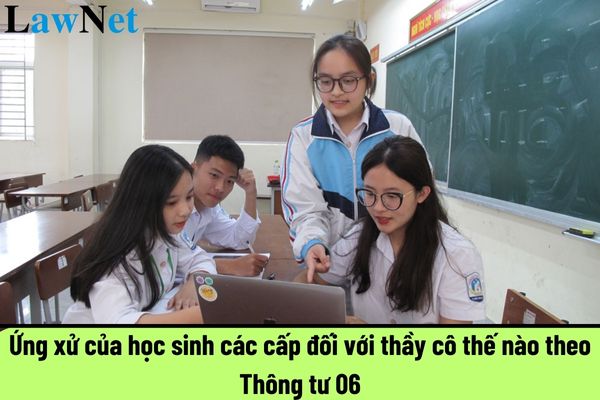What is the code of conduct for students towards teachers in Vietnam according to Circular 06? What are the rules for formulating the code of conduct for students in Vietnam?
What is the code of conduct for students towards teachers in Vietnam according to Circular 06?
Under Article 8 of Circular 06/2019/TT-BGDDT regarding the code of conduct for learners in general education institutions and continuing education institutions:
Code of conduct for learners in general education institutions and continuing education institutions
1. Behavior with administrative officers, teachers and staff: Show respect, politeness, honesty, sharing, and observe the requirements as prescribed. Do no fabricate information; do not offend spirit, honor, dignity, or inflict violence.
2. Behavior with other learners: Use language which is proper, friendly, honest, cooperative, helpful and respect differences. Do not use bad language, swear, insult, cause disunity; do not fabricate; do not spread information to slander, affect honor and dignity of other learners.
3. Behavior with parents and relatives: Show respect, politeness, honesty, and love.
4. Behavior with visitors to educational institutions: Show respect, politeness
Circular 06 stipulates the code of conduct for students towards teachers in Vietnam as follows:
- Show respect, politeness, honesty, sharing, and observe the requirements as prescribed;
- Do no fabricate information; do not offend spirit, honor, dignity, or inflict violence

What is the code of conduct for students towards teachers in Vietnam according to Circular 06? What are the rules for formulating the code of conduct for students in Vietnam? (Image from the Internet)
What are the rules for formulating the code of conduct for students in Vietnam?
Under Article 3 of Circular 06/2019/TT-BGDDT specifying the rules for formulating the code of conduct for students in Vietnam:
- Comply with laws and regulations; conform to ethic standards, fine customs and cultural traditions of the nation.
- Demonstrate core values: Compassion, respect, responsibility, cooperation, honesty in the relationship of each member in the educational institution to others, to the surrounding environment and for themself.
- Ensure the orientation of moral education, lifestyle, culture, development of the virtue and capacity of the learners; enhance the professional ethics of administrative officers, teachers, staff and responsibility of the heads of educational institutions.
- Easy to understand and implement; suitable for age, level and cultural characteristics of each region.
- The formulation of and amendments to the content of the Code of Conduct must be discussed democratically, objectively, openly and with the consensus of the majority of members of the educational institutions.
What is the regulatory age of students at different educational levels in Vietnam?
Under Article 28 of the Education Law 2019, students' age at different educational levels is as follows:
Educational levels and entry ages
1. Educational levels and age groups of general education are regulated as follows:
a) Primary education lasts for 05 school years, from the first to the fifth grade. The entry age for the first grade is 06;
b) Lower secondary education lasts for 04 school years, from the sixth to the ninth grade. Students must complete the primary educational programme before entering the sixth grade. The entry age for the sixth grade is 11;
c) Upper secondary education lasts for 03 school years, from the tenth to the twelfth grade. Students must complete the lower secondary educational programme before entering the tenth grade. The entry age for the tenth grade is 15;
2. Cases where schooling could be commenced at younger ages or at higher ages prescribed in clause 1 of this Article are as follows:
a) Commencing schooling at younger ages for students with early intellectual development;
b) Commencing schooling at older ages for students repeating classes, students living in areas with exceptional socio-economic difficulties, students belonging to ethnic minorities, disabled and handicapped students, students with physical or intellectual disadvantages, orphan students, students of poor households, students returning from overseas and other cases as prescribed by law.
3. General education shall be divided into 2 phases: basic education and career-orientated education. Basic education includes primary education and lower secondary education; career-oriented education is upper secondary education. Students of institutions of vocational education shall learn the upper secondary education knowledge.
4. The Minister of Education and Training shall stipulate the teaching and learning of the Vietnamese language to children of ethnic minorities prior to the commencement of the first grade; the teaching of the upper secondary education knowledge in institutions of vocational education; and the cases as prescribed in clause 2 of this Article.
Thus, under the specified regulations, the regulatory age of students at different educational levels in Vietnam is as follows:
- Primary education lasts for 05 school years, from the first to the fifth grade. The entry age for the first grade is 06;
- Lower secondary education lasts for 04 school years, from the sixth to the ninth grade. Students must complete the primary educational programme before entering the sixth grade. The entry age for the sixth grade is 11;
-Upper secondary education lasts for 03 school years, from the tenth to the twelfth grade. Students must complete the lower secondary educational programme before entering the tenth grade. The entry age for the tenth grade is 15;
*Note: This regulation does not apply to students skipping a grade or studying at an older age as per legal regulations.

